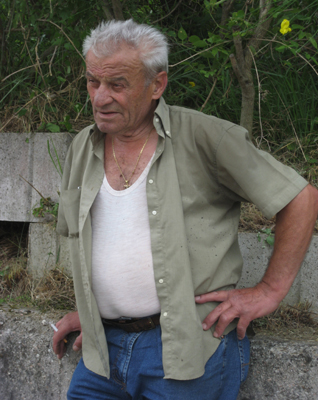
 |
 |
Luigi
Ceccarini |
Carlo
Ciaschini |
|
By Ian Roeber
Along a street lined with blooming flowers, two
men labor in the morning sun. One man, wearing a sweat-stained undershirt,
pushes a wheelbarrow with debris while the other man trims the foliage
in his orange hunting vest. Their glistening, tanned faces reflect the
last two hours they’ve spent working in the sun, and their hands
are worn from the hard work. Yet these two men are not the young laborers
usually seen working around the town of Cagli; both are in their late
sixties.
This morning work routine is nothing new for Carlo Ciaschini,
67, and Luigi Ceccarini. 68. For nearly a year, the two have been serving
the community of Cagli as part of a program organized by the city. Originally
designed to provide working opportunities for the older population of
the town, the program sends these two men and ten others to different
sites around Cagli each day.
“The idea is to give them something else
to do besides sitting in the bar drinking wine and playing cards,”
says Patricio Benelli, the supervisor in the Public Works Office.
Instead these men are busy with weed whacking,
planting, and picking up trash at each site. For Ciaschini and Ceccarini, tasks like these are somewhat different
from the work they did before. With nearly 31 years experience in roadwork,
Ciaschini used his carpentry skills to help form the concrete bases in
road and bridge construction. Ceccarini was a mason. When comparing their
previous trades with the work they do now, Ciaschini simply shrugs and
explains, “This work is just not that complicated."
Both say the program provides an alternative
to the bar lifestyle that many older Cagliesi fall into. “Going
to the bar, all you do is drink. I prefer not to,” says Ceccarini. Yet for the two men there is a much larger reason for working in the sun
each day. Specifically, the program is more than an alternative; it represents
a way of life. As sweat rolled down his nose, Ciaschini expressed how,
“It’s better to work. If you stop moving, it’s over.”
However, for Ciaschini there is another reason
to work in the program. He rubs his thumb and fingers together in the
universal gesture for money. Each individual in the program receives seven
euro an hour (six euro after paying for insurance) and on average he works
190 hours a year. Such low numbers prompt Ciaschini to describe the money
he earns as poco, a small amount.
“We have to bring our own tools,”
Ciaschini says. “It’s like the Middle Ages.”
Ciaschini and Ceccarini are ordinary Cagliesi. When they aren’t
working, they enjoy gardening; and Ceccarini prides himself on his hunting
skills, having killed three wild boars last season.
Pulling out a cigarette on a brief break from
work, Ciaschini begins to rub his knees, indicating a few sore joints.
Ceccarini, who stopped smoking years ago, approaches, stooping under the
weight of the heavy weed whacker slung over his shoulder.
Soon the two will pack the wheelbarrow, broom
and rusty shovels into Ceccarini’s old car, Ciaschini will hop on
his Vespa, and the two will return to relaxation. “All day? No,
that would be too much,” Ceccarini says.
Yet tomorrow these two will be back to serve the community
that has provided them with so much for many years.
Video by Claire Davis
Photos by Allison Bockman
Web Design by Takako Sato |

